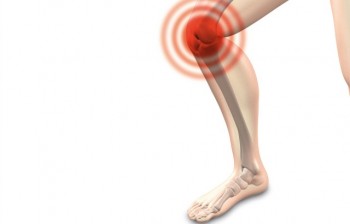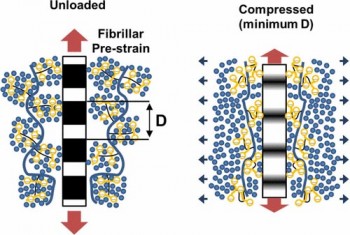News
Research paper identifies the secret life of collagen
12 September 2017


Dr Gupta and Prof Knight have just published exciting results which cast light on how cartilage is able to withstand the demanding mechanical environment of the joint and may eventually help to explain why cartilage breaks down with ageing or arthritis. Collagen changes its crystallinity in response to physical forces, so the ordered arrangement in collagen molecules of the cartilage in our knees may be flipping from one structural state to another with every step we take.
Dr Himadri Gupta, from QMUL’s School of Engineering and Materials Science, said: “Pain and reduced mobility due to joint diseases currently affects over 8 million people in the UK, the majority of these aged over 65. With increasing life expectancy, understanding how to ensure healthy ageing of cartilage is extremely important.” Co-author, Professor Martin Knight, added: “The response of collagen to physical forces is critical to the function of cartilage in our joints and therefore understanding this behaviour may help us develop new strategies to prevent cartilage degradation.”
The results published in the journal ACS Nano, reveal that the fibrils show a sudden reversible change in their crystalline ordering a short while after the cartilage was compressed and that this change is due to an internal rearrangement of molecules inside the fibril. This previously unseen behaviour of the collagen fibres was completely changed when the tissue is degraded as happens in osteoarthritis.
The researchers are now seeking to understand the effect of repetitive activity and injury in ageing cartilage, and the implications for cartilage health, supported by new funding from the UK Biotechnology and Biological Research Council.
Research paper: ‘The Secret Life of Collagen: Temporal Changes in Nanoscale Fibrillar Pre-Strain and Molecular Organization during Physiological Loading of Cartilage’. Sheetal R. Inamdar1, David P. Knight2, Nicholas J. Terrill3, Angelo Karunaratne4, Fernando Cacho-Nerin3, Martin M. Knight1 and Himadri S. Gupta1*. ACS Nano
| Contact: | Martin Knight |
| Email: | m.m.knight@qmul.ac.uk |
| People: | Martin KNIGHT Himadri GUPTA |
| Research Centre: | Bioengineering |
Updated by: Martin Knight




